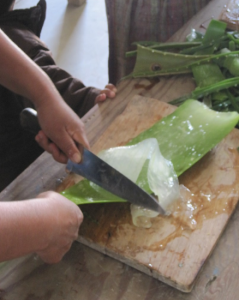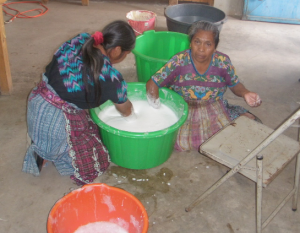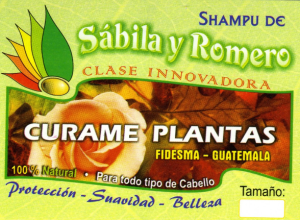by Patricia Hamill
Summer 2012 InGear

Although P4P is not currently planning on adding stoves to its repertoire of collections and shipments, we felt that it was important to highlight how organizations like FIDESMA search out every option available to enable every possible idea or practice to evolve into a thriving business. When David went to visit this winter, Señora Margarita proudly pointed out how lovely the local women’s hair is. No matter how long or short, there seemed to be no lack of health and shine in these ladies’ tresses. To those of us with access to every miracle product modern chemistry and “new” natural options offer, this may seem mundane, but this is not a cosmopolitan area and no store holds ready-made specialized products. She took David to see for himself how FIDESMA was involved in the production and dissemination of the product responsible for this beauty: shampoo made from locally grown agave by local women and available for sale beyond local boundaries.

Is this remarkable? Not in general, until you become aware of the fact that without the stoves that FIDESMA provides, they would only be able to make smaller batches over longer periods of time, thus ensuring that only enough shampoo would be made for personal or local consumption. These stoves make the difference between limited cottage industry and competitive sustainable products creating reliable income.
Alongside the dominant Hispanic population, there are a number of small groups of indigenous people in and around San Andrés who have supported themselves by marketing the products of their ancestors. On his tour, David met Doña Ana Maria Guich and her friends, a group of indigenous women who have been producing the soft-soap shampoo at FIDESMA since the year 2000. The making of the shampoo itself is labor-intensive and fascinating to watch. This process is done by hand in a modest space provided as well by FIDESMA. On the day that David visited the ladies, he watched as they prepped the 120 leaves they had gathered from 20 plants and began the process of cleaning, slicing open, and scraping out the extremely gooey centers of the leaves. They added to this gelatinous mass equal parts water, mixed it all together, and then cooked the concoction on the stoves. After the cooling down, the shampoo was left to sit for 1-2 days before being bottled. At least one hundred pounds of leaves are needed to in order to make 400 bottles.

This time-consuming work had been done in makeshift shelters or in the direct sun before these women came to be associated with the foundation. The most basic changes to the mechanics of the process and the working environment allow Doña Ana and her partners the chance to make a greater return on their labor and reach a wider consumer base, thus perpetuating the interest in and dedication to continuing to create this sustainable product. Perhaps our readers will one day find this shampoo on shelves in American stores that participate in promoting safe ingredients, sustainable consumption, and fair-trade imports.
